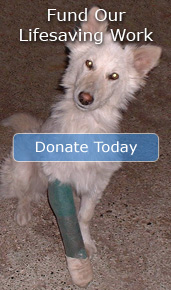|
BRIGITTA MACMILLAN'S PRESENTATION TO THE BC SPCA COMMUNITY CONSULTATION PANEL HELD IN THE FALL OF 2001 WHICH RESULTED IN RECOMMENDATIONS TO THE SPCA THAT IT HAD BETTER REFORM
Destruction stats from the Maple Ridge SPCA web site 1994-2001
Dear AAS,
Here's a presentation for your files that I made at the SPCA yesterday afternoon. The first part is 'same old same old' but I ultimately told them where they stand: "This whole cumbersome exercise of public consultation appears to be a political gambit to buy time until the furor dies down. I am here to tell you that this is not going to go away."
September 20, 2001
My name is Brigitta MacMillan. I've lived in the Lower Mainland for the last 45 years and I supported the SPCA all my life as did my parents before me. I regarded the SPCA as an island of compassion for animals in a human-focused world and I wanted to do more to help. When I had time to volunteer I became a dog walker in Maple Ridge. Once I became a regular visitor to an SPCA shelter, my eyes were opened. The attitude I encountered from the staff and the level of care for the animals left me confused, then sickened and angry. The staff showed indifference towards the animals who received minimal care. Adoptions were not encouraged; killing was routine. Staff were condescending towards the volunteers and one particular staff member was openly hostile. I wrote a letter about all this to the senior constable at the shelter. But nothing
changed. Over the next two years I communicated to higher levels of the SPCA regarding my concerns - concerns shared by the other volunteers - and nothing changed.
The people who actively wanted to help the animals were the volunteers. Volunteers fought to see several animals' ailments treated, volunteers checked the cages to see that each animal had food and water (frequently they did not). Volunteers fought to foster cats and find homes for them. Volunteers began a mobile animal adoption unit in in Maple Ridge in '99 which has found homes for more than 700 animals that would otherwise have been killed. Staff's response to this last initiative? A grievance that volunteers were taking work away from them. If the SPCA had taken the initiative to try and save more lives instead of warehousing and eliminating them, the volunteers would have been relieved to be able to step back. As for the hostile staff member: she continued as she always had, apparently with complete impunity.
A group of five volunteers were told by Mr. Brian Nelson, Director of Field Operations, (AAS comment: boss of the Vancouver SPCA's pound contracting empire and former private pound contractor who quit when his boss's salary was revealed, click here) in a meeting - and I quote - the shelter must be a sanctuary for the employees. The inescapable conclusion was that the SPCA's priority was the comfort level of its people rather than animal welfare.
By January of this year, it appeared to me that the only way left to help the animals was to quit the SPCA and take my concerns to the donors. The SPCA, from shelter staff to Board of Directors, showed no inclination to change.
Over a period of two years I gave the SPCA input about problems and recommendations for change, as I know many other people did. Not until public scrutiny was focused on the SPCA and contracts with municipalities were lost did the SPCA respond. It asked for public input. This rather cumbersome process of public consultation has now consumed many months, and the problems I described in letters as far back as May of '99 continue unabated. My pleas have been couched in ever stronger terms. I think this one will be the strongest yet.
In August I sent the public consultation panel an e-mail. It documented how a cat had been fostered by a volunteer in early August and was then treated by the volunteer for an severe flea infestation. This cat purred under the volunteer's touch but the volunteer could clearly see that she was not well and took her to Alouette Animal Hospital. The vet there determined that she was so malnourished and dehydrated that she could not be saved, and they euthanized her. This cat spent the last five days
of her life in the SPCA shelter: flea ridden, dehydrated and malnourished. I wrote in the e-mail, quote: "Surely management should advise staff that tending to the animals' needs is a requisite part of the job for which they are paid -- it is not optional. I cannot accept that conveying this to staff should wait until the Community Consultation process is complete." end quote
Yet nothing has improved for the animals at the SPCA shelter as of this date. Volunteers find cats without food and water. They tend to them and the animals eat and drink with urgency. Animals in need of medical attention are left untended. Volunteers have documented incidents with names and dates. More than once they have arrived at the shelter only to find three staff members sitting around the front office doing nothing while a community service worker with the minimum of experience,
training or concern cleans and feeds the cats without supervision. On at least one occasion, it was noon and staff were sitting around the front office while a community service worker was in the cat room; the cats still were not cleaned, fed and watered. Most recently, a kitten was placed in isolation at the shelter and a volunteer was told that distemper was suspected. More than two weeks later - twice the incubation period for panleukopenia - the kitten was still isolated. When the volunteer asked several staff members why, and what was planned for it, not one staff member knew, or seemed inclined to find out. The
quality of this SPCA shelter is a joke, and I understand things are much the same in other SPCA shelters.
Clearly staff have still not been told that the animals' welfare has any priority. The care of these dependent, voiceless creatures has been left to community service workers. (These are people who clean cages in lieu of jail time, they don't necessarily bring with them a wealth of compassion and expertise.) The work and expense of fostering and nursing sick cats back to health and adopting them out is shouldered by volunteers. But staff take home a pay cheque for whatever marginal care they provide.
I'd like to see some sign that the SPCA is sincere in this initiative to improve. That requires action, not lip service. It requires visible commitment and change, not promises and platitudes. This much is not complicated: donors contribute millions of dollars to see unwanted animals cared for. That the SPCA understands this, is evidenced by their emphasis on the word "compassion" throughout their pamphlets and publications. The most basic part of compassion is meeting the animals' need for food, water, medical care and cleanliness. Staff must be told: this is their job. It's not complicated.
The SPCA was founded to relieve the suffering of animals. To this day it claims a mandate of compassion. Yet veterinarian Dr. Dear, (president of the Vancouver SPCA board of directors, read more, click here) an intelligent, educated businessman, indulged Mr. Hooper's demands for ever more money even though there's no budget to help very seriously ill or injured animals and the SPCA continues to beg for donations of food and basic supplies that it apparently can't afford to purchase. This is only the most obvious manifestation of the SPCA's real priorities. As a volunteer, I saw for myself that the SPCA's claims of compassion and its day-to-day practices at the shelter level are sharply at odds. The fact that the union wants the SPCA to pursue animal control contracts and has protested volunteers' efforts to increase adoptions demonstrates where
their priorities are.
The SPCA has shown itself to be an autocratic and impervious bureaucracy that is indifferent to the public other than to curry favour for the sake of donations. Pay cheques, benefits, and job security are a higher priority than the animals. That is what is apparent about the SPCA as it exists now. Donors do not want to support any of the SPCA's employees in the manner to which they've become accustomed. Unless the SPCA is seen to change, people who want to help animals will direct their support to groups that do that.
This whole cumbersome exercise of public consultation appears to be a political gambit to buy time until the furor dies down. I am here to tell you that this is not going to go away. Former employees and volunteers will continue to speak up and let the public know what they've seen. To carry on without changing, the SPCA would have to become even more of a secret society than it has been so far and shut out every animal lover who might speak up. That is not going to be possible. Anyone who seeks to perpetuate the old order wherein animals are a dispensable commodity will be shamed in the eyes of a public that
increasingly recognizes the rights of all sentient beings.
My recommendation to the SPCA is this. If it is not prepared to heed its critics and make the radical changes proposed to it immediately, then it must abandon its pretense of being an animal welfare agency. It must abandon slogans such as "speaking for those who cannot speak for themselves" and "100 years of compassion". In my opinion these claims are blatantly fraudulent. Go after the animal control contracts that the union covets. But be honest. Be honest if nothing else. Change the
organization's name to "BC Animal Control" and let animal lovers direct their support to the many smaller, volunteer-run groups that actually shelter, heal, alter and find homes for unwanted animals. There must be transparency and accountability in any group. But if some of these volunteer-run groups were given support anywhere near what the SPCA has enjoyed over the last many years, the problems of animal overpopulation and suffering could finally be seen to be addressed with the passion and
commitment they deserve.
Brigitta MacMillan,
Maple Ridge, BC |






